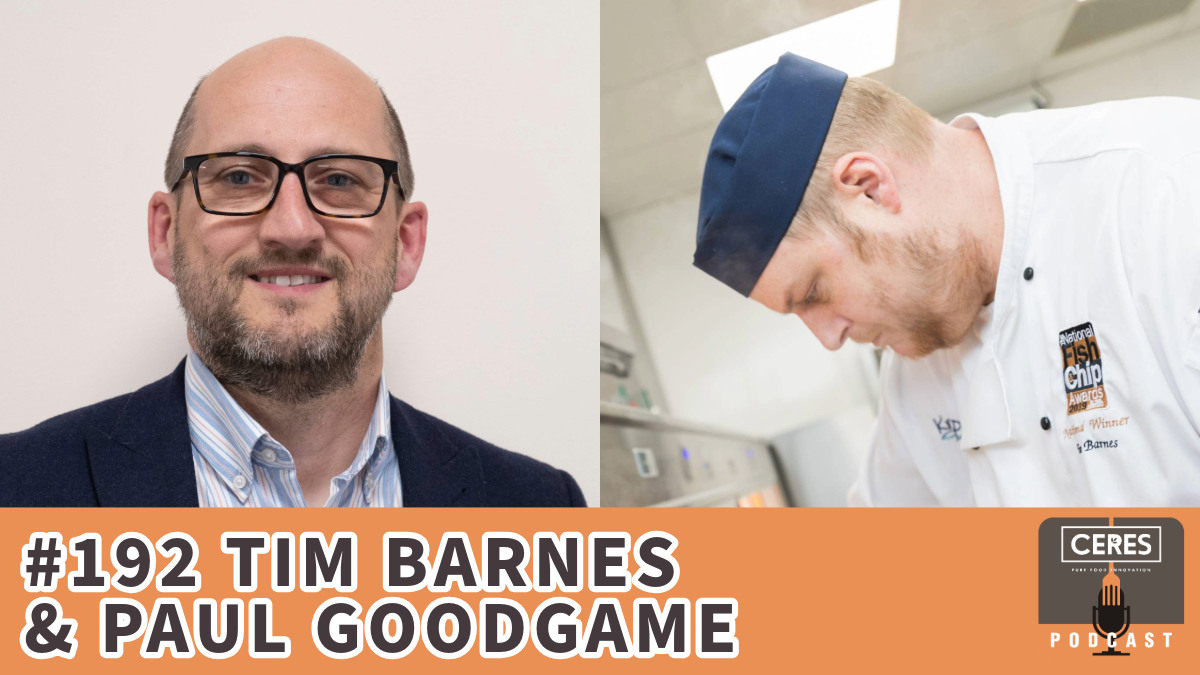Episode 192: Weathering the Storm – Tim Barnes and Paul Goodgame on Challenges, Innovation, and People Power in Fish & Chips
Posted by Emma on 20th Nov 2024 Reading Time:
The fish and chip industry is no stranger to challenges, but how do leading figures navigate unpredictable weather, staffing pressures, and economic uncertainties? In Episode 192 of The Ceres Podcast, host Stelios is joined by Tim Barnes, Director of Krispies Fish & Chips, and Paul Goodgame, Managing Director of The Chesterford Group. Together, they dissect what it takes to thrive in an ever-changing environment.

Tim and Paul share how unpredictable elements impact their businesses, from snowy days disrupting customer flows to the operational chaos that extreme weather brings. While snow dampens walk-in trade, delivery orders often surge—a phenomenon compounded by challenges with courier services. Tim recounts his experience rallying his team with a 4x4 during bad weather, while Paul highlights the strain on aggregators and drivers during extreme conditions.
A central theme of the episode is people—whether it's managing staff, building relationships with delivery drivers, or transforming young employees into confident leaders. Paul emphasises the importance of culture and development, noting how the younger generation flourishes when given responsibility and support. Tim reflects on the life skills young employees gain in the industry, joking that running a fish and chip shop often feels like running a school for life.
Yet, managing people isn't without its challenges. Tim and Paul agree that staffing issues—absenteeism, lack of training, or personal struggles—can overshadow other operational hurdles. Stelios chimes in with his perspective, noting that while technology and processes have solutions, people's challenges are often more nuanced and complex.
As economic pressures mount, innovation becomes vital. Paul reveals how upgrading technology, such as EPOS systems and digital loyalty programs, is central to improving customer experience and operational efficiency. Meanwhile, Tim discusses the introduction of self-service kiosks and strategic menu adjustments to streamline operations and reduce costs.
Stelios connects these innovations to broader trends, emphasising the need to eliminate friction in operations. He cites Ceres's approach to automating data entry and optimising product packaging as examples of how small efficiencies can significantly impact.
Both guests discuss how offers and discounts can drive volume but stress the importance of careful execution. Paul highlights the effectiveness of targeted offers that bring customers in-store, while Tim explains how Krispies is exploring meal deals inspired by fast food giants like McDonald's.

The discussion extends to the unique advantage of fish and chip shops: their ability to handle high volumes efficiently compared to other types of takeaways. Stelios points out how understanding the intricacies of a frying range can unlock profitability during busy periods.
The conversation shifts to the broader economic landscape, including the impact of rising National Insurance contributions and minimum wage increases. Tim and Paul share concerns about the knock-on effects on prices, consumer confidence, and business growth.
Paul notes that while higher wages might theoretically lead to increased spending power, the reality is more complicated as rising costs offset potential gains. Stelios echoes this sentiment, sharing how Ceres mitigates rising costs through operational efficiencies rather than passing the full burden onto customers.
The trio also delves into the challenges of the current VAT structure for out-of-home food. Stelios argues for extending VAT to all prepared food to level the playing field, pointing out the financial pressure this disparity places on fish and chip shops compared to supermarkets and other food businesses.

